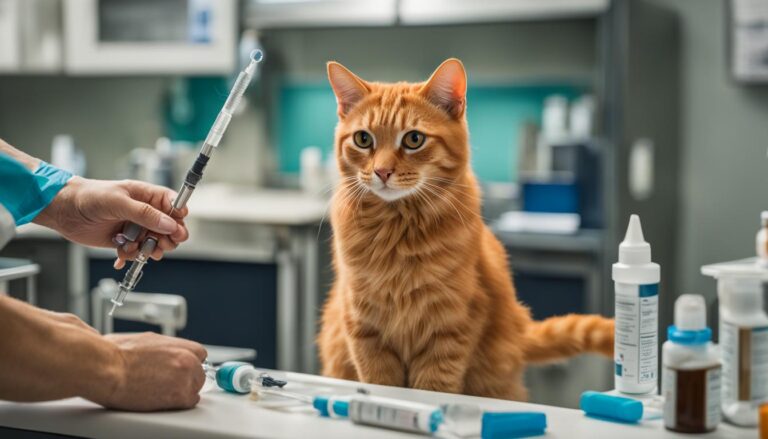If you’ve noticed your feline friend sneezing more than usual, you might be wondering, “Why is my cat sneezing?” Cats sneeze for various reasons, ranging from harmless irritants to underlying health conditions.
Sneezing in cats can be triggered by a simple nose tickle, exposure to noxious odors or chemicals, dust and airborne particles, foreign objects like lint or hair, respiratory infections, inflammation of the nasal cavity or sinuses, and even tooth infections causing drainage into the sinuses.
Understanding the causes behind your cat’s sneezing can help you determine the appropriate course of action. In this article, we will explore the common reasons why cats sneeze and when it’s necessary to seek veterinary care.
Principales conclusiones:
- Cats can sneeze due to various factors, including nasal irritants, infections, and dental issues.
- Frequent sneezing accompanied by discharge, lack of energy, and loss of appetite may indicate a need for veterinary care.
- Allergies, upper respiratory infections, and dental disease are common causes of cat sneezing.
- Treatment options depend on the underlying cause and may involve medications, supportive care, or dental treatments.
- Regular monitoring of your cat’s sneezing and prompt veterinary attention can help prevent complications and ensure your cat’s well-being.
When to See a Veterinarian
If your cat is sneezing frequently with no other symptoms or only mild symptoms, you can monitor them for a day or two to see if the sneezing resolves on its own. Sometimes, cats may sneeze due to a harmless nose tickle or exposure to dust or other irritants.
However, if the sneezing persists or is accompanied by other signs such as discharge from the nose or eyes, lack of energy, or loss of appetite, it may indicate an upper respiratory infection or another underlying condition that requires veterinary care. Kittens, in particular, should always be seen by a vet for these symptoms as their immune systems are not as developed.
When you take your cat to the veterinarian, they will perform a physical examination and may recommend further tests such as blood work or a nasal swab to determine the cause of the sneezing. Treatment options will depend on the underlying condition and may include antibiotics, antiviral medications, eye and nose drops, and supportive care to alleviate symptoms and promote recovery.
When to See a Veterinarian
“If your cat experiences frequent sneezing with no other symptoms or mild symptoms, you can monitor them for a day or two. However, if the sneezing persists or is accompanied by discharge from the nose or eyes, lack of energy, and loss of appetite, it may indicate an upper respiratory infection or other underlying condition that requires veterinary care.”
| Signs to Watch For | Posibles causas |
|---|---|
| Discharge from the nose or eyes | Upper respiratory infection |
| Lack of energy | Underlying health condition |
| Pérdida de apetito | Upper respiratory infection or other illness |
Treatment Options for Cat Sneezing
- Antibiotics or antiviral medications may be prescribed to treat upper respiratory infections.
- Eye and nose drops may help alleviate symptoms such as discharge.
- Supportive care, such as providing a comfortable and clean environment, may aid in recovery.
- For chronic conditions, frequent veterinary care and maintenance medications may be necessary.
It’s important to remember that the treatment for cat sneezing will depend on the underlying cause. Your veterinarian will be able to provide a tailored treatment plan for your cat’s specific needs.
Causes of Sneezing in Cats
When your cat starts sneezing, it can be concerning. Sneezing in cats can be caused by a variety of factors, including allergies, respiratory infections, dental disease, foreign objects in the nasal passage, chronic upper respiratory conditions, and even tumors in rare cases.
Allergies are a common cause of sneezing in cats. Just like humans, cats can be allergic to certain substances such as pollen, dust mites, or certain foods. Allergies in cats often result in skin irritations, but they can also manifest as sneezing, watery eyes, and coughing.
Respiratory infections are another possible cause of sneezing in cats. These infections can be viral or bacterial and may lead to symptoms such as nasal discharge, eye discharge, coughing, and lethargy. If your cat’s sneezing is accompanied by these symptoms, it may be a sign of a respiratory infection that requires veterinary attention.
In some cases, dental disease can cause sneezing. Tooth infections or abscesses can lead to drainage into the sinuses, resulting in sneezing. If your cat has persistent sneezing and you suspect dental issues, a visit to the vet is recommended to address the underlying problem.
Allergies, Respiratory Infections, and Dental Disease: A Comparison
| Allergies | Respiratory Infections | Dental Disease | |
|---|---|---|---|
| Síntomas | Sneezing, watery eyes, coughing, skin irritations | Nasal discharge, eye discharge, coughing, lethargy | Sneezing, dental pain, difficulty eating |
| Causa | Allergens such as pollen, dust mites, or certain foods | Viral or bacterial infections | Tooth infections or abscesses |
| Treatment | Specialized treatment plans, customized vaccines | Antiviral medications or antibiotics | Dental treatment, removal of infected teeth |
If you suspect that your cat is experiencing allergies, respiratory infections, or dental disease, it’s essential to consult with a veterinarian for a proper diagnosis and treatment plan. Your vet will be able to recommend the most suitable course of action to address the underlying cause of your cat’s sneezing and ensure their overall health and well-being.
Treatment Options for Cat Sneezing
Cat sneezing can be caused by various factors, and the treatment options depend on the underlying cause. If your cat is sneezing due to an upper respiratory infection, your veterinarian may prescribe antiviral medications or antibiotics to help clear the infection. They may also recommend eye and nose drops to alleviate symptoms and promote healing. In some cases, supportive care such as subcutaneous fluids may be necessary to keep your cat hydrated and comfortable.
If your cat has a chronic respiratory condition, long-term management may be required. This can involve regular visits to the veterinarian for check-ups and adjustments to the treatment plan. Medications may be prescribed to help control symptoms and improve your cat’s quality of life.
Allergies can also cause sneezing in cats, and specialized treatment plans may be necessary. Your veterinarian may recommend allergy testing to identify the specific allergens affecting your cat. This can help develop an individualized treatment plan, which may include allergen avoidance, medication, or immunotherapy. Immunotherapy involves gradually exposing your cat to small amounts of the allergen to build up their immune tolerance over time.
If dental disease is the cause of your cat’s sneezing, dental treatment may be necessary. This can involve professional cleaning, tooth extraction, or other dental procedures to address the underlying infection or inflammation. Your veterinarian will assess your cat’s dental health and recommend the appropriate treatment.
| Treatment Options | Descripción |
|---|---|
| Medications | Antiviral medications or antibiotics may be prescribed for upper respiratory infections. |
| Eye and Nose Drops | These can help alleviate symptoms and promote healing. |
| Supportive Care | Subcutaneous fluids may be administered to keep your cat hydrated. |
| Long-term Management | Chronic respiratory conditions may require regular visits to the vet for medication adjustments. |
| Allergy Treatment | Allergy testing can help develop a customized treatment plan, which may include allergen avoidance or immunotherapy. |
| Dental Treatment | Tooth extraction or other dental procedures may be necessary for cats with dental disease causing sneezing. |
It’s important to consult with your veterinarian to determine the most appropriate treatment for your cat’s sneezing. They will be able to evaluate your cat’s overall health and provide tailored recommendations based on their specific condition. Remember, prompt treatment can help alleviate discomfort and prevent serious complications.
If you’re unsure about your cat’s health or have any concerns, it’s always best to seek professional advice from a veterinarian.

Conclusión
Cat sneezing can be caused by a multitude of factors, from harmless irritants to more serious infections or diseases. It is crucial to closely monitor your cat’s sneezing patterns and accompanying symptoms to determine if veterinary care is required. Prompt treatment can help alleviate discomfort and prevent any potential complications that may arise.
Remember, if your cat experiences frequent sneezing with no other symptoms or mild symptoms, you can keep an eye on them for a day or two. However, if the sneezing persists or is accompanied by discharge from the nose or eyes, lack of energy, and loss of appetite, it may indicate an upper respiratory infection or another underlying condition that warrants veterinary attention. It’s always better to err on the side of caution and seek professional advice from a veterinarian.
Depending on the cause of the sneezing, treatment options can vary. Upper respiratory infections may require antiviral medications or antibiotics, as well as eye and nose drops. Chronic conditions may necessitate frequent veterinary care and the use of medications to manage symptoms. Allergies can be managed through specialized treatment plans and customized vaccines. Dental disease may require dental treatment and the removal of infected teeth.
In conclusion, cat sneezing can be a sign of various underlying issues, and it is essential to address them promptly. By staying vigilant and seeking veterinary expertise when needed, you can ensure your furry friend receives the appropriate diagnosis and treatment to improve their well-being and overall health.




